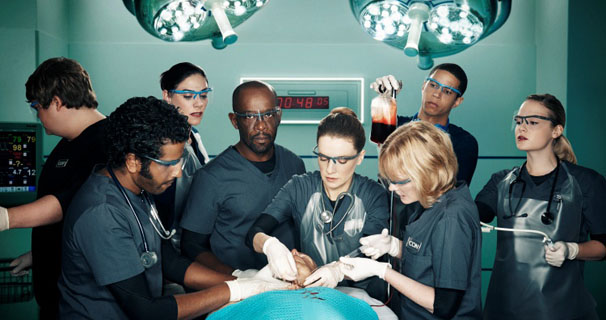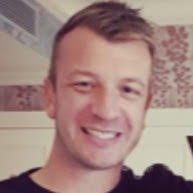'Could I save someone's life? I'd give it a go!' says Critical star Lennie James

The latest updates, reviews and unmissable series to watch and more!
You are now subscribed
Your newsletter sign-up was successful
Want to add more newsletters?

ONCE A WEEK
What to Watch
Get all the latest TV news and movie reviews, streaming recommendations and exclusive interviews sent directly to your inbox each week in a newsletter put together by our experts just for you.

ONCE A WEEK
What to Watch Soapbox
Sign up to our new soap newsletter to get all the latest news, spoilers and gossip from the biggest US soaps sent straight to your inbox… so you never miss a moment of the drama!
Lennie James (The Walking Dead, Line of Duty) is the star of Sky 1's new real-time medical drama Critical (Sky 1, Tuesday) which follows a special trauma unit as they battle to save the life of a critically ill patient.
Just like hit American show 24, each episode follows the action minute-by-minute and we caught up with Lennie to talk about the show and whether he could actually save a person's life...
What attracted you to Critical?
"Two words: Jed Mercurio. He is a superb writer, and we discovered when we worked together on Line of Duty that we speak each other’s language. Also it’s a fantastic leading part, and the concept of a real-time medical show is brilliant. So when I was offered the part of Glen, it was a complete no-brainer to accept it."
Tell us a little bit about Glen...
"He is a lieutenant colonel in the British Army Medica l Corps who's been in Bastion, on and off. For the last two years he's kind of been jumping from placements in Afghanistan and disaster areas; famine, drought. Those kind of things. Just adrenalin chasing, really. And then he gets a telephone call and he comes back to City General to shape a team in this new trauma unit."
It’s his ex, Fiona, that calls him back in the first episode isn't it?
"Yeah he has to work alongside the woman he has loved and lost. Their affair was fuelled by how well they worked together. They were a really well-oiled machine. But something traumatic happened between them. But now she’s called him and brought him back to this hospital – and many complications ensue!"
Is there still something between them?
"Definitely. They've realised a lot about each other in the two years they've been apart. When Fiona (Catherine Walker) phones and tells him, 'I need you', it’s a lifeline for Glen. He comes running – she didn’t need to ask him twice because there is still such a bond there. Over the course of the 13 episodes, you discover what they really mean to each other. It’s a bumpy, but compelling ride."
Can you explain the show’s unique format to us?
"What is brilliant about Critical is its 'real time-ness'. We’re trying to be as close to reality as possible, and I think we’ve achieved it better than anything outside documentary. So we don’t go home with the characters. The patient comes in to the trauma unit and the clock starts ticking. And everything plays out in that magic hour, we stay with the patient whose life they’re trying to save."
The latest updates, reviews and unmissable series to watch and more!
How have you found it having to act out surgical procedures?
"I spent ages observing surgeons at St George's Hospital, but I was so nervous when I had to do my first laparotomy. A real-life surgeon, was at the monitor watching me and a fterwards he said I had surgeon’s hands, and he felt that I could save lives with them. I probably couldn’t, but I’m so pleased he said my hands looked like they knew what they were doing. I have won awards, but that is among the highest compliments I’ve ever received."
Would you like to have been a doctor?
"If I was 18 again, I’d try medicine. That was never a possibility when I was growing up – it never came across my radar. Having said that, I feel incredibly lucky. I’m doing a job I love, and it brings me immense satisfaction. The fact that I’m paid to do it is just a plus. It’s the best job in the world – outside of being a professional footballer, which sadly was never a possibility!"
If there was a real trauma, would you feel confident that maybe you could help?
"I get asked that question all the time. Like, friends, family, everyone goes, 'You could probably do it now'. Erm, no is the answer to that, but that doesn't mean I wouldn't give it a go!"
Having done this, does it make it difficult for you to watch other TV medical dramas?
"Yeah it does. I tried to watch one – which will remain nameless – the other day and I went, 'I just want to see how they're doing it.' And I suddenly became like doctors must be…"
How did you avoid that on Critical?
"At the beginning of this, my first question to all of the medical advisers was, 'What's your pet hate about medical shows?' They weren't shy about giving them, so I was, 'Let's not to do that. Let's not do that, and let's not do that. If it's not medically correct, let's not do it'."
Did you watch the second series of Line of Duty?
"I did. It was fantastic."
Did you think, 'I wish I was still there'?
"There were a couple of points where I was utterly gutted. I'm not going to lie to you. I knew going in on the first one I wasn't coming back for any more, so it wasn't like a surprise. Although quite early on into this one I did say to Jed, 'Don't kill me! I'm not crossing any roads any time soon'. But, yeah, I'd be lying if I said i didn't feel a bit envious because everyone else got to come back and I knew the time they were having – without me! I was gutted."
Sean is a Senior Feature writer for TV Times, What's On TV and TV & Satellite Week, who also writes for whattowatch.com. He's been covering the world of TV for over 15 years and in that time he's been lucky enough to interview stars like Ian McKellen, Tom Hardy and Kate Winslet. His favourite shows are I'm Alan Partridge, The Wire, Wolf Hall and Succession and in his spare time he enjoys drinking tea, doing crosswords and watching football.


